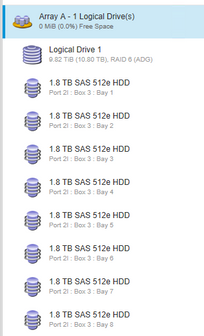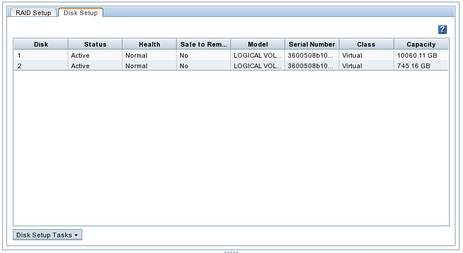- Community Home
- >
- Storage
- >
- Midrange and Enterprise Storage
- >
- StoreVirtual Storage
- >
- Adding disks to an existing 2-node VSA cluster
Categories
Company
Local Language
Forums
Discussions
Forums
- Data Protection and Retention
- Entry Storage Systems
- Legacy
- Midrange and Enterprise Storage
- Storage Networking
- HPE Nimble Storage
Discussions
Forums
Discussions
Discussions
Discussions
Forums
Discussions
Discussion Boards
Discussion Boards
Discussion Boards
Discussion Boards
- BladeSystem Infrastructure and Application Solutions
- Appliance Servers
- Alpha Servers
- BackOffice Products
- Internet Products
- HPE 9000 and HPE e3000 Servers
- Networking
- Netservers
- Secure OS Software for Linux
- Server Management (Insight Manager 7)
- Windows Server 2003
- Operating System - Tru64 Unix
- ProLiant Deployment and Provisioning
- Linux-Based Community / Regional
- Microsoft System Center Integration
Discussion Boards
Discussion Boards
Discussion Boards
Discussion Boards
Discussion Boards
Discussion Boards
Discussion Boards
Discussion Boards
Discussion Boards
Discussion Boards
Discussion Boards
Discussion Boards
Discussion Boards
Discussion Boards
Discussion Boards
Discussion Boards
Discussion Boards
Discussion Boards
Discussion Boards
Discussion Boards
Community
Resources
Forums
Blogs
- Subscribe to RSS Feed
- Mark Topic as New
- Mark Topic as Read
- Float this Topic for Current User
- Bookmark
- Subscribe
- Printer Friendly Page
- Mark as New
- Bookmark
- Subscribe
- Mute
- Subscribe to RSS Feed
- Permalink
- Report Inappropriate Content
08-07-2017 03:09 AM
08-07-2017 03:09 AM
Adding disks to an existing 2-node VSA cluster
I currently have a configuration where there are 2 x dl380 Gen9 servers with 2 existing physical arrays:-
8 x 1.8Tb SAS
3 x 400Gb SSD
This is presented within the VSA as 2 disks Tier0 and Tier1.
I need to add 2 x 1.8Tb disks to each host and want to be certain of the method to do this and what downtime would be involved.
Do I create a new array at the controller level (so a new RAID1 array?) or can I expand the existing 8 x 1.8Tb array to a 10 x 1.8Tb array on each host?
Within the VSA I understand I cannot expand the existing logical disk so will need to add the new storage as new disks and then expand the existing volume etc - does this require downtime on the VSA?
Thanks
- Mark as New
- Bookmark
- Subscribe
- Mute
- Subscribe to RSS Feed
- Permalink
- Report Inappropriate Content
08-07-2017 11:55 PM
08-07-2017 11:55 PM
Re: Adding disks to an existing 2-node VSA cluster
Hi
you can expand the existing array of 1.8TB disks but you must create a new logical drive
we the new space.
this can be done with no downtime if you can configure using the smart storage administrator
in VMware this can be done with command line.
but the easiest way is to do it through intelligent provisioning (F10).
you can do it one node at a time so no downtime after that adding the new disk to VSA is online
see 12.6 HPE StoreVirtual Storage VSA Installation and Configuration Guide
page 34 adding storage.
Regards
give a KUDO if this helps
- Mark as New
- Bookmark
- Subscribe
- Mute
- Subscribe to RSS Feed
- Permalink
- Report Inappropriate Content
08-08-2017 12:50 AM - edited 08-08-2017 12:55 AM
08-08-2017 12:50 AM - edited 08-08-2017 12:55 AM
Re: Adding disks to an existing 2-node VSA cluster
thanks for the reply so if i understand correctly...
Within Smart Storage Administrator I need to create a new logical drive? I can add the new disks to the existing array but then need to create a new logical drive within that? - I cannot expand the existing logical drive that is already presented through to the VSA cluster?
Or can I expand the existing logical drive at controller level BUT have to create a new logical drive at VSA level?
The PDF that I have read through doesn't quite make this clear unfortunately so just want to be certain
- Mark as New
- Bookmark
- Subscribe
- Mute
- Subscribe to RSS Feed
- Permalink
- Report Inappropriate Content
08-08-2017 11:32 PM
08-08-2017 11:32 PM
Re: Adding disks to an existing 2-node VSA cluster
Hi Colin,
The way I'm doing it is adding the new disks to the existing array - this start a transform of the array and takes hours, while the raid controller is doing this I start up VMware and the VSA, so the VSA is online and the volumes are protected. When the transform is done, I boot the host again to Smart Storage via Intelligent Provisioning and expand the Logical Disk with the new space. Then I perform the same on the other host.
Finally I expand the Local storage datastores in VMware, shutdown and add a new VMDK disk to each VSA with the new space. After the start you can see the new disk in the VSA and add it.
If you are using the HPE Custom ESXi you can work with this through SSH to the ESXi to see progress:
esxcli ssacli cmd -q "controller slot=0 ld all show detail"
- Mark as New
- Bookmark
- Subscribe
- Mute
- Subscribe to RSS Feed
- Permalink
- Report Inappropriate Content
08-09-2017 12:09 AM
08-09-2017 12:09 AM
Re: Adding disks to an existing 2-node VSA cluster
Thanks for the reply.
In HyperV world here so unfortunately I cannot match your process. I just want to be certain that I am covering the process correctly at controller level.
From what I have read I believe I have to add the 2 physical disks to each server, then at controller level ADD the new disks to the existing Array:-
BUT then crucially I have to create NEW logical drive with those 2 disks?? <-- that is my key question
I guess that this then presents a new disk within Disk Management, add this to the VSA and then within the management software add as a new disk:-
Pg 34 of the manual also suggests:-
"IMPORTANT: If you are adding disks to StoreVirtual VSAs that are already in a cluster, be aware that the process may take more time and that the CMC does not prevent multiple storage systems in a cluster from being taken offline. When adding a disk, the storage system is restarted and the new disk is formatted. The format operation may take a long time to complete if the new disk is large. New writes are then resynchronized with the other storage systems in the cluster, which can impact performance.
Has that been your experience.
Thanks the assistance.

